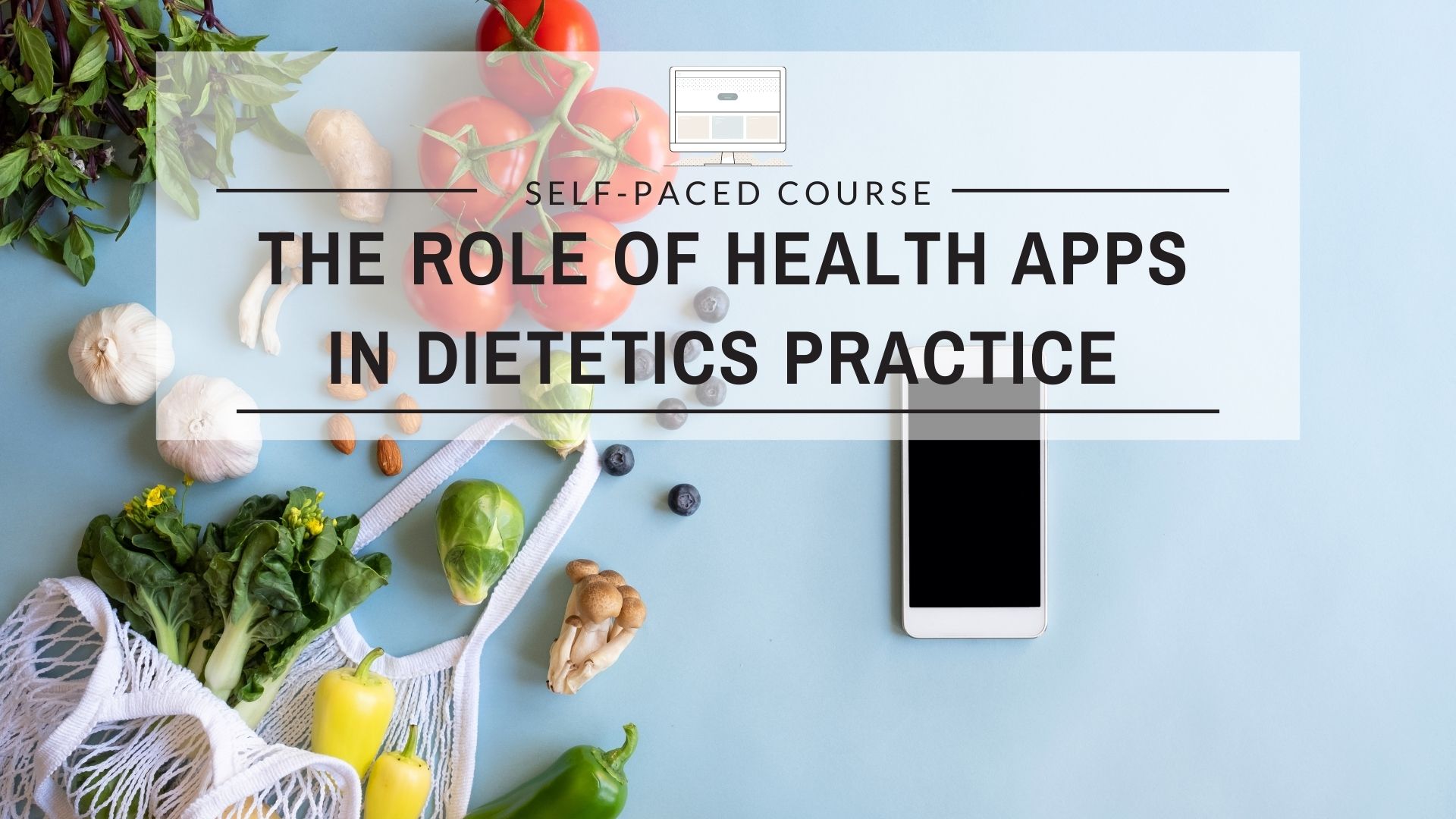Become familiar with a variety of food programs that can be used at Farmers’ Markets while learning the benefits of Farmers’ Markets and ways to promote Farmers’ Markets within your community.
Continuing Education Credits: CHES CECH
|
Toward Universal Design is a 3-part series starting with a presentation given by Dr. Amanda Kraus, followed by an archived version of a live question and answer session, and finishing with a panel discussion with people discussing their experience living with a disability. Universal design refers to an over-arching set of ideals to create buildings, environments, products and activities that are Universally accessible to all members of society. While this is a hefty goal, this module will help individuals to understand its importance from a disability standpoint.
Continuing Education Credits: CHES CECH
|
This training discusses the use of Mobile Health Apps to enhance nutrition intervention. The training will lead you through best practices to use when introducing health apps to clients and presents a screening tool that can be used to gauge the usefulness of various Health Apps for your clients. During part two of this training you will participate in a simulated role play experience introducing a Health App to your client.
Continuing Education Credits: CHES CECH
|
This presentation will help attendees understand the importance of advanced care planning.
Continuing Education Credits: CHES CECH CPEU
|
Service providers seek to understand what motivates clients to change and improve their health. Approaches that use evidence-based practices have been developed, tested, and known to work to motivate clients for positive health behavior change. I Ola Lāhui organization utilizes integrated behavioral health approaches by applying culturally-minded practices to better deal with complex mental health and chronic diseases. Sponsored by University of Hawaii, Hawaii Public Health Training Hui.
Continuing Education Credits: CHES CECH
|
Few programs have recognized and integrated distinctive characteristics of many AIAN communities, specifically the value placed on shared identity, group cohesion and collective resilience. This presentation will share strategies implemented in one American Indian community that strive to make healthy food choices and physical activity a community responsibility, not individual challenge.
Continuing Education Credits: CHES CECH
|
Community Directed Diabetes Program are a central part of the fight against type 2 diabetes in many native communities. These programs, funded by the IHS Special Diabetes Project for Indians (SDPI), provide diabetes prevention and management services that address the needs of their communities, and oftentimes use innovative ways to encourage healthier eating, physical activity, and lifestyle habits in their communities. In this presentation we will review some of the nutrition related activities offered by Tucson Area SDPI diabetes programs, most specifically, those from the Tohono O’odham Nation.
Continuing Education Credits: CHES CECH
|
Obesity has become a major health problem among American Indians. Lifestyle risk behaviors include nutrient-poor food and drink choices, larger food portions, and physical inactivity. This program will describe an American Indian Youth Summer Medical Wellness Camp that addresses the growing number of Arizona's Indian youth who are at risk for or who have been diagnosed with type II diabetes.
Continuing Education Credits: CHES CECH
|
The Holiday season can be a very difficult time for patients, healthcare providers, and families due to increases of personal and professional obligations. This training will educate participants to practice self-care management and de-stress techniques.
Continuing Education Credits: CHES CECH CNE CPEU
|
Wayne Tormala, Chief of the Bureau of Tobacco & Chronic Disease at the Arizona Department of Health Services, discusses communication strategies to prevent vaping among youth in Arizona.
Continuing Education Credits: CHES CECH CNE
|
Prioritization and time management are critical skills for success. Managing your time means that you spend time on your priorities, and that you do not waste time on non-priorities. This training presents time management and prioritization techniques to improve the work activities of local health departments.
Continuing Education Credits: CHES CECH CPEU
|
Professional ethics can be a code of principles and well as represent how healthcare professionals handle their conduct with best standards and informed decisions. Professional ethics can be viewed as the best benefit for both the client and for those in the profession. When conduct done well, it allow the highest public’s trust in the profession and encourage the clients to seek their professional services.
Continuing Education Credits: CHES CECH
|
Twelve training modules introduce concepts and techniques on finding the best use of resources
Continuing Education Credits: CHES CECH
|
With the use of current technology we know more than ever that breastfeeding is about more than nutrition. Technological advances in nanotechnology, epigenetics, ultrasound, infant brain imaging and the human microbiome have given us critical information. With all the knowledge that we have, practices need to change as well. Changes in simple practices can lead to increased success for women with breastfeeding. This training presents a case study highlighting areas of practice where interventions can improve breastfeeding success.
Continuing Education Credits: None
|
This training session will analyze how we commonly frame disability in society and examine how these frames influence professional practice. We will discuss language, media and design and the power of each to shape the disability experience. By analyzing existing systems, we will discuss concepts of universal design and identify ways for participants to increase access by removing the barriers that exclude individuals from participation. Finally, we will review the resources available on campus to faculty, staff and students through the Disability Resource Center. The presenter will also facilitate a question and answer period directly following the presentation.
Continuing Education Credits: None
|
Dr. Melinda Wharton, deputy director of the National Center for Immunization and Respiratory Diseases at the Centers for Disease Control and Prevention, speaks to students and faculty at the University of Arizona Mel and Enid Zuckerman College of Public Health during National Infant Immunization Week (NIIW) in 2011.
Continuing Education Credits: None
|
Asthma is life-threatening when students do not have the tools to manage symptoms effectively. The stock albuterol inhaler program provides an albuterol inhaler to be kept in the school health office (e.g., stock albuterol) in the event that a student is experiencing respiratory distress and does not have access to their own rescue inhaler. This e-learning course provides mandatory training for school personnel designated to administer the stock albuterol inhaler.
Continuing Education Credits: CHES CECH
|
This training consists of a presentation given by Karla D. Wagner, Ph.D, assistant professor at the University of Nevada, Reno School of Community Health Sciences. After the presentation you will be asked to complete a role play exercise where you provide information based on the material covered in the presentation.
Continuing Education Credits: None
|
This training consists of a presentation given by Katie Stout, MBA, Executive Director of the Center for Hope of the Sierras in Reno, NV. After the presentation you will be asked to complete a role play exercise where you provide information based on the material covered in the presentation.
Continuing Education Credits: None
|
Developed out of a collaboration from the Western Region Public Health Training Center, Children's Clinics, Arizona Department of Child Safety, and Arizona LEND, this presentation includes an overview of Children's Clinics, and Children's Rehabilitative Services, and background information on Spina Bifida and Cerebral Palsy, including medical implications, education and health systems, active life and support, and home care and treatment.
Continuing Education Credits: None
|
This course introduces health disparities facing rural America and some of the determinants of health that factor into the health status of rural communities.
Continuing Education Credits: None
|
This training provides an overview of planning and developing a program evaluation and includes a virtual role play, where you will have a chance to apply the knowledge and skills learned.
Continuing Education Credits: None
|
Learners will develop an awareness of the dynamics of domestic violence and sexual violence specific to immigrant populations to be able to implement appropriate interventions for victims of domestic and sexual violence.
Continuing Education Credits: CHES CECH
|
Learn common nutritional challenges refugees face upon resettlement. Recognize difficulties refugees encounter upon arrival to a new food environment. Apply strategies to help refugees overcome common nutrition challenges.
Continuing Education Credits: None
|
This course introduces factors that increase risk of obesity in Hmong and other Southeast Asian communities in the United States.
Continuing Education Credits: None
|
|

























